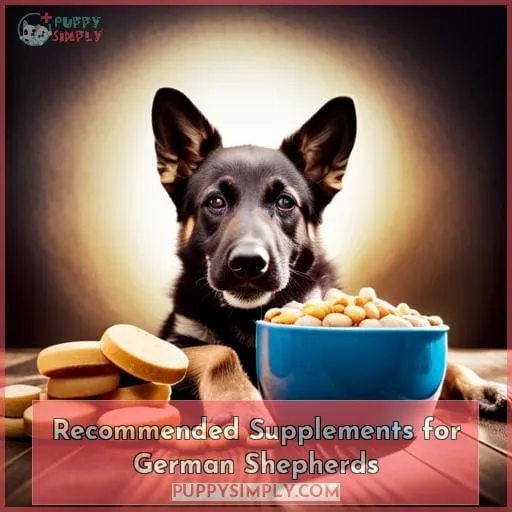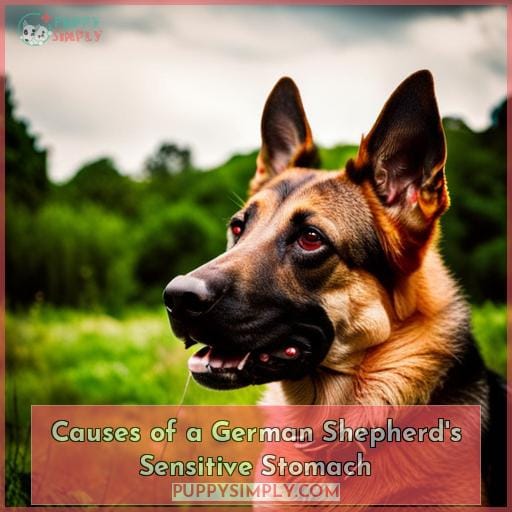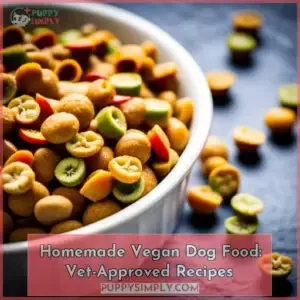This site is supported by our readers. We may earn a commission, at no cost to you, if you purchase through links.
 Unleash the full potential of your German Shepherd’s health with our homemade food guide.
Unleash the full potential of your German Shepherd’s health with our homemade food guide.
Say goodbye to kibble and discover the benefits of tailored nutrition for your loyal companion.
This comprehensive guide will provide you with:
- Essential nutrients
- Recommended supplements
- Even natural remedies for a sensitive stomach.
With our expert advice, you can take control of your dog’s diet and ensure they thrive on a healthier, homemade meal plan.
Let’s embark on this journey together towards a happier and more vibrant life for your German Shepherd!
Table Of Contents
- Key Takeaways
- Benefits of Homemade Dog Food for German Shepherds
- Reasons to Feed Homemade Dog Food to German Shepherds
- Essential Nutrients for German Shepherds
- Recommended Supplements for German Shepherds
- Health Dietary Changes for German Shepherds
- Homemade Dog Food Recipes for German Shepherds
- Causes of a German Shepherd’s Sensitive Stomach
- Natural Remedies for German Shepherds With Sensitive Stomachs
- Foods That Are Good for German Shepherds With Sensitive Stomachs
- Frequently Asked Questions (FAQs)
- How do I transition my German Shepherd from commercial dog food to homemade dog food?
- Can I feed my German Shepherd a vegetarian or vegan homemade diet?
- What are some common signs of allergies in German Shepherds and how can I determine which ingredients are causing the allergies?
- How do I calculate the appropriate portion sizes for my German Shepherd’s homemade meals?
- Are there any specific homemade dog food recipes that are recommended for German Shepherds with sensitive stomachs?
- Conclusion
Key Takeaways
- Healthier alternative to commercial kibble
- Tailored nutrition for German Shepherds
- Promotes longevity and disease prevention
- Avoids allergies and obesity
Benefits of Homemade Dog Food for German Shepherds
Homemade dog food offers numerous benefits for German Shepherds.
Firstly, it provides a healthier alternative to commercial kibble by using fresh, whole ingredients that are lower in harmful additives and preservatives.
Additionally, homemade dog food allows you to tailor the nutrition to meet your German Shepherd’s specific dietary needs, promoting their overall health and longevity.
Lastly, homemade dog food can help prevent certain diseases such as allergies and obesity due to its higher quality ingredients and absence of fillers or artificial substances.
Health benefits of homemade dog food
By feeding your German Shepherd homemade dog food, you can significantly improve their health and well-being.
Homemade dog food offers numerous benefits such as affordability, freshness, and increased nutritional value compared to commercial kibble.
You have control over the ingredients used in their meals, ensuring safety and avoiding common allergens.
Additionally, homemade dog food can be tailored to meet your German Shepherd’s specific dietary needs while also providing a delicious taste that they’ll love.
Importance of tailored nutrition
To ensure optimal health and well-being for your German Shepherd, it’s crucial to tailor their nutrition according to their specific dietary needs.
This personalized approach takes into consideration individual needs, such as food sensitivities, allergies, and digestive issues.
By creating a homemade diet specifically designed for your German Shepherd’s unique requirements, you can provide them with the necessary nutrients while avoiding ingredients that may cause adverse reactions.
This holistic approach of tailored nutrition promotes overall health and addresses potential health conditions more effectively than generic commercial dog food options.
Longevity and disease prevention
To promote longevity and prevent disease in your German Shepherd, homemade dog food offers numerous benefits.
By providing a balanced and nutritionally complete diet tailored specifically to the needs of your dog, you can help support their overall health and well-being.
Homemade dog food has been shown to contribute to:
- Fewer vet visits
- Lower costs associated with medical care
- Improved coat quality
- Increased energy levels
- Potentially longer life expectancy
Reasons to Feed Homemade Dog Food to German Shepherds
Feeding homemade dog food to your German Shepherd can provide numerous benefits.
Not only is it healthier and more affordable than commercial dog food,
but it also allows you to have better quality control over the ingredients.
Homemade dog food can be tailored to meet your German Shepherd’s specific dietary needs, ensuring they receive the proper nutrition for optimal health and longevity.
Health benefits of homemade dog food
Feed your German Shepherd homemade dog food to provide them with numerous health benefits.
Homemade dog food isn’t only cost-effective, but it also ensures the safety of the ingredients used.
By making their meals at home, you can customize their diet to meet their specific nutritional needs and avoid potential allergies or sensitivities.
Additionally, homemade dog food contains fresh ingredients that are higher in nutrients compared to processed kibble, promoting overall health and well-being for your furry friend.
Longevity and disease prevention
By feeding homemade dog food to your German Shepherd, you can help promote their longevity and prevent diseases.
Homemade dog food is rich in nutrients that support cancer prevention and reduced inflammation, leading to a healthier immune system.
It also improves heart health and circulation, supports joint health and mobility for active dogs, enhances cognitive function for mental clarity, and contributes to healthy skin with a shiny coat.
Consider grain-free or limited ingredient diets along with appropriate supplements for optimal results while ensuring the safety of your dog’s food.
Tailoring to dietary needs
Customizing the diet to meet their specific dietary needs is one of the main reasons why feeding homemade dog food can be beneficial for German Shepherds.
By tailoring their meals, you can ensure that they receive optimal nutrition based on factors such as age, activity level, breed, size, and any health conditions or allergies they may have.
Homemade dog food allows you to address issues like sensitive stomachs, diarrhea,vomiting,constipation,stomach problems & intolerances while providing them with a convenient and budget-friendly option.
Essential Nutrients for German Shepherds
Now that you understand the benefits of feeding homemade dog food to your German Shepherd, let’s delve into the essential nutrients they need for optimal health.
Providing a balanced diet is crucial in ensuring your furry companion receives all the necessary nutrients.
- Protein for muscle development and repair
- Fat for energy and nutrient absorption
- Carbohydrates as a source of fuel
- Vitamins to support various bodily functions
- Minerals like calcium for strong bones
By including these vital components in their homemade meals, you can ensure that they thrive on a nutritious raw diet tailored specifically to their needs. Remember that proper nutrition is key when bidding farewell to kibble and embracing this wholesome approach towards nourishing your loyal companion.
Recommended Supplements for German Shepherds
To ensure that your German Shepherd is getting all the necessary nutrients they need, supplements can be a beneficial addition to their homemade diet.
One important supplement for joint health is glucosamine chondroitin, which helps support healthy cartilage and joint function. Joint support chews, such as Finn Joint Support Chews, are a convenient way to provide this supplement.
Additionally, slow feeder dog bowls can help prevent fast eating and reduce the risk of bloat in large breed dogs like German Shepherds.
For immune support, consider adding Vetsmart Turkey Tail Mushroom Immune Support or probiotics to your dog’s diet. These supplements can help boost their immune system and promote overall well-being.
When incorporating supplements into your German Shepherd’s homemade food plan, it’s essential to follow dosage instructions provided by the manufacturer or consult with a veterinarian for guidance.
Health Dietary Changes for German Shepherds
To make healthy dietary changes for your German Shepherd, start by adjusting their portion sizes and meal frequency.
- Weight management: Monitor your dog’s weight and adjust their food intake accordingly. If they need to lose weight, reduce the portion size and increase exercise.
- Food allergies: Pay attention to any symptoms of food allergies such as itching, digestive issues, or skin problems. Consult a vet if necessary.
By making these dietary changes and following professional guidance from experts in the field, you can ensure that your German Shepherd is receiving optimal nutrition for their overall health and well-being while enjoying delicious homemade meals tailored just for them.
Homemade Dog Food Recipes for German Shepherds
If your German Shepherd is ready to say goodbye to kibble, here are some homemade dog food recipes that you can try.
For a simple and nutritious option, consider the Chicken & Rice Delight. This recipe includes chicken as a lean source of protein and rice for carbohydrates.
Another recipe option is the Beefy & Veggie Medley, which combines beef with a variety of vegetables for added vitamins and minerals.
If you’re looking for something different, try the Turkey, Vegetable & Quinoa Feast featuring turkey as the main protein source along with sweet potatoes for added fiber and nutrients.
For dogs who enjoy fish, there’s also the Salmon & Pumpkin Delight that provides omega-3 fatty acids from salmon and fiber from pumpkin.
Lastly, if lamb is more appealing to your pup’s taste buds then give them Lamb & Green Beans meal!
Remember to consult with your veterinarian before making any significant changes in your dog’s diet.
Causes of a German Shepherd’s Sensitive Stomach
There are several potential causes of a German Shepherd’s sensitive stomach.
- Food intolerances and allergies can lead to digestive issues,
- As well as dietary changes or sensitivities.
It’s important to identify any underlying health conditions that may be contributing to the sensitivity in order to address them properly.
By understanding these causes, you can take appropriate steps to alleviate your German Shepherd’s sensitive stomach and promote their overall digestive health.
Food intolerances and allergies
If your German Shepherd has a sensitive stomach,
it may be caused by:
- Food intolerances: Common ingredients like beef,
dairy products can trigger reactions.
- Allergies: Wheat & chicken are common culprits.
Symptoms of these conditions include itching,
skin rashes/infections,& gastrointestinal issues
Diagnosis entails elimination trials/blood tests
Homemade diets tailored to their needs help alleviate
symptoms while providing necessary nutrition
Dietary changes and sensitivities
Make dietary changes to address your German Shepherd’s sensitive stomach by eliminating potential food sensitivities or allergens.
Consider using slow feeder bowls to prevent rapid eating and digestive upset.
Additionally, incorporating probiotics into their diet can promote a healthy gut microbiome and aid in digestion.
A chicken and rice diet or bland diet may be beneficial during periods of gastrointestinal upset.
If necessary, an elimination diet can help identify specific trigger foods causing sensitivity symptoms.
Identifying underlying health conditions
To identify underlying health conditions that may be causing your German Shepherd’s sensitive stomach, observe their behavior and look for any signs of gastrointestinal distress.
Irritants, stress, antibiotics can contribute to digestive problems and GI upset.
Food sensitivities or intolerances can also cause diarrhea or other symptoms.
Overeating or gulping food too quickly can lead to digestive issues as well.
Avoid quick diet changes and feeding table scraps to help maintain a healthy digestion in your German Shepherd.
Natural Remedies for German Shepherds With Sensitive Stomachs
Control your German Shepherd’s sensitive stomach naturally with these remedies.
When it comes to alleviating digestive issues in German Shepherds, there are several natural solutions you can try.
Incorporating probiotics and digestive enzymes into their diet can help promote a healthy gut flora and aid in digestion.
Slow feeder bowls can also be beneficial as they encourage slower eating, reducing the chances of overeating or gulping down food too quickly.
Additionally, implementing portion control through a chicken and rice diet or bland diet can provide relief for sensitive stomachs by offering easily digestible ingredients that are gentle on the gastrointestinal tract.
Calming treats may help alleviate anxiety-related symptoms that contribute to an upset stomach as well.
Lastly, consider incorporating digestive supplements specifically formulated for dogs with conditions like gastroparesis to support overall gastric health.
Foods That Are Good for German Shepherds With Sensitive Stomachs
Choosing the right foods can be crucial in managing a German Shepherd’s sensitive stomach. When it comes to feeding your furry friend, opting for a bland diet with limited ingredients may help alleviate digestive issues.
- Homemade food: Prepare meals using fresh and wholesome ingredients tailored to meet your dog’s specific needs.
- Slow feeding: Use slow-feeding bowls or puzzle toys to encourage slower eating, reducing the likelihood of upset stomachs.
- Probiotics and digestive enzymes: These supplements can promote healthy digestion and support gut health in dogs with sensitive stomachs.
- Chicken, rice, pumpkin, and sweet potato: These gentle ingredients are often well-tolerated by dogs with sensitivities.
By incorporating these foods into their diet gradually while monitoring their response closely, you can find what works best for your German Shepherd’s delicate digestion.
Frequently Asked Questions (FAQs)
How do I transition my German Shepherd from commercial dog food to homemade dog food?
To transition your German Shepherd to homemade dog food, gradually replace a portion of their commercial food with homemade meals.
Consult a veterinary nutritionist for guidance on the proper nutritional balance and ingredients to include in their diet.
Can I feed my German Shepherd a vegetarian or vegan homemade diet?
Feeding your German Shepherd a vegetarian or vegan homemade diet may limit their nutrient intake.
Dogs are omnivores and need essential nutrients from animal sources.
Stick to a balanced diet that meets their nutritional needs for optimal health and well-being.
What are some common signs of allergies in German Shepherds and how can I determine which ingredients are causing the allergies?
Some common signs of allergies in German Shepherds include:
- Itching
- Redness
- Digestive issues
To determine which ingredients are causing the allergies, you can try an elimination diet or consult with a veterinarian for allergy testing.
How do I calculate the appropriate portion sizes for my German Shepherd’s homemade meals?
To calculate the appropriate portion sizes for your German Shepherd’s homemade meals, consult with a veterinary nutritionist or canine nutrition specialist.
They can assess your dog’s individual needs and provide accurate guidance based on scientific research and evidence.
Are there any specific homemade dog food recipes that are recommended for German Shepherds with sensitive stomachs?
For German Shepherds with sensitive stomachs, try these homemade dog food recipes:
- Gentle chicken and rice delight
- Soothing turkey, vegetable & quinoa feast
Your pup’s tummy will thank you!
Conclusion
As you bid farewell to kibble and embark on a journey towards a healthier diet for your German Shepherd, you’re taking a vital step towards their overall well-being.
By following our homemade food guide, you can ensure that your loyal companion receives the essential nutrients and tailored nutrition they need to thrive.
From recommended supplements to natural remedies for a sensitive stomach, this comprehensive guide equips you with the knowledge to provide your German Shepherd with a happier and more vibrant life.
Say goodbye to kibble and unleash their full potential today.















